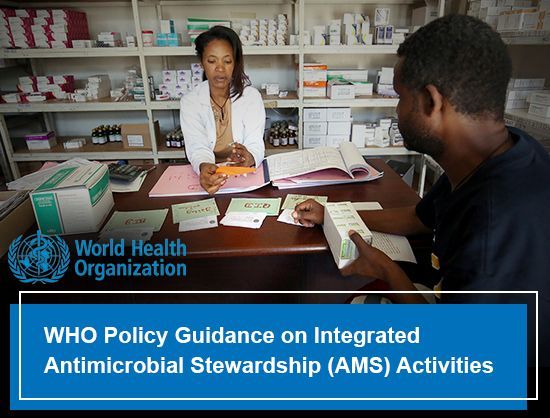
Member States have requested WHO policy guidance on how to facilitate the implementation of national AMS activities in an integrated and programmatic approach. This policy guidance responds to that demand from Member States and is anchored in public health guiding principles in the human health sector. It provides evidence-based and pragmatic recommendations to drive comprehensive and integrated AMS activities under the purview of a central national coordination unit, National AMR steering or coordinating committees or other equivalent national authorities.
Please note that this course is part of a training package, so please register for the complementary course Antimicrobial stewardship programmes in health-care facilities in low- and middle-income countries: a WHO practical toolkit so that you can complete your learning journey.
Photo Credits: WHO/Colin Cosier
Language: English
Course information
The course will comprise 4 learning modules, with each module focusing on a specific aspect of the WHO Policy Guidance on Integrated Antimicrobial Stewardship Activities. Each module is divided into topics and sub-topics to facilitate better learning retention and recall, and to prevent learner fatigue.
The course will progressively develop learners' understanding of the need for AMS, provide insights into what AMS entails, how it can best be implemented and what Assessment Tools are available to enable a successful AMS implementation. The Assessment Tool will be explained through a guided simulation that enable learners to 'walkthrough' the various sections. The learning modules will be followed by a summary and an objective assessment to gauge the learners' understanding. The policy guidance complements the Global Action Plan, the WHO practical toolkit for AMS programmes in health-care facilities in low- and middle-income countries and other WHO guidance in surveillance, IPC and WASH.
What you'll learn
- Understand the key aspects of AMS Policy Guidance
- Interpret the package of integrated AMS activities and how they are structured
- Identify the important considerations for a successful implementation of Integrated AMS activities
- Illustrate the use of Periodic National Assessment Tool in their own context
Course contents
Module 1: Introduction to AMS Policy Guidance:
By the end of this module, you should be able to: understand the concept of antimicrobial resistance and antimicrobial stewardship, and the drivers for AMR; define AMS and understand how it is a coherent set of integrated actions; identify responsible and appropriate use of antimicrobials, with proper and optimised prescribing/diagnosis and improvement of patient outcomes; relate AMS actions with access to affordable and quality-assured antimicrobials, IPC, WASH and vaccination coverage; summarise how the policy guidance will facilitate the implementation of national AMS activities in an integrated and programmatic approach; identify the target audiences of the policy guidance at various levels; evaluate how the policy guidance promotes the implementation of comprehensive and integrated interventions efficiently.Module 2: Package of integrated AMS activities:
By the end of this module, you should be able to: analyze the 12 interventions organized under 5 pillars for implementation of an integrated AMS approach; discover the national coordination mechanisms for AMS and develop guidelines; explain the need to ensure access to and regulation of antimicrobials; interpret the importance of improving awareness, education and training; explore the need to strengthen water, sanitation and hygiene (WASH) and infection prevention and control (IPC); evaluate the need to establish national surveillance programmes for antimicrobial use and consumption; and monitoring and evaluation of AMS activities.Module 3: Implementation considerations:
By the end of this module, you should be able to: explore the key considerations and steps for implementing AMS activities in an integrated manner including; developing national policy; establishing and strengthening coordination mechanisms at all levels; conducting baseline assessment and situation analyses; developing national policy; developing an implementation plan; mobilising human and financial resources; engaging in advocacy and raising awareness; building capacity to implement plansModule 4: Periodic National Assessment Tool :
By the end of this module, you should be able to: identify the purpose, intended users and also when/how to conduct the assessment; explain the various sections of the Periodic National Assessment Tool and how it is to be used.Module 5: Summary:
By the end of this module, you should be able to: summarise all the topics covered in this course.Module 6: Assessment
Enroll me for this course
Certificate Requirements
- Gain a Record of Achievement by earning at least 75% of the maximum number of points from all graded assignments.
- Gain an Open Badge by completing the course.